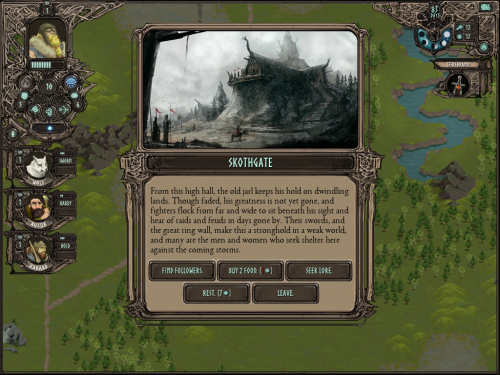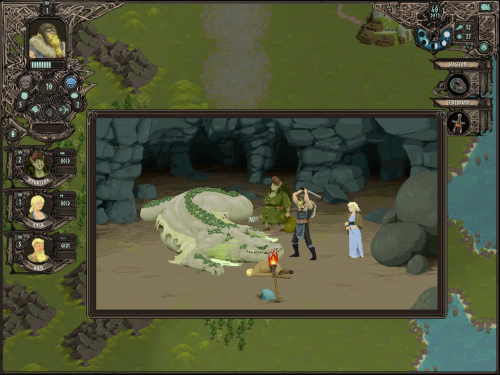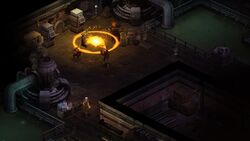Fallen Gods Update #1: Introducing Fallen Gods
Fallen Gods Update #1: Introducing Fallen Gods
Game News - posted by Infinitron on Sat 17 February 2018, 01:10:18
Tags: Fallen Gods; Mark Yohalem; Wormwood StudiosAs members of our community may know, the next game from Primordia creator Mark Yohalem is Fallen Gods, a roguelite RPG inspired by Norse folklore, the board game Barbarian Prince, the computer game King of Dragon Pass, and the Lone Wolf gamebooks. Fallen Gods has been in development since 2014, and was first properly revealed at the end of 2015. After that we heard little about it, other than a look at a preliminary teaser trailer in 2016. I was almost ready to dismiss the game as vaporware, but the interview with Mark earlier this month should have been a clue that I was wrong. Although it still has no release date, it seems that Fallen Gods is now far along enough to finally show in detail. Today's introductory post on the Wormwood Studios blog is only the first in a series of weekly development updates. It includes a few screenshots:


Once, the world was better, the gods greater, the wars over, the end farther. You were born in the Cloudlands during those days, one of the Ormfolk, forever young and strong, worshiped by those below for your forefathers’ deeds. But all is not well. Now, wolves and worse haunt the night, the law holds no sway, and men’s hearts grow hard toward your kind. Fearful of their dwindling shares of souls, your brothers turned against each other ... and against you. And so you were cast down from the clouds, a fallen god broken upon the bitter earth. You rise, still free from death, with only the slightest hope of winning your way back to the heavens that are your rightful home.
Fallen Gods is an RPG inspired by the board game Barbarian Prince, the computer game King of Dragon Pass, and the sagas, eddas, and folklore of the far north. With a dark, wry tone, it tells the story of a god trying to survive in a dying world ruled by beings with great might and wits, but without the wisdom to heal the wounds left by their wars. The game has been in production for about four years, and its concepts have been building in my head for decades.
At the core of Fallen Gods are interactive events, choose-your-own-adventure vignettes in the spirit of the Lone Wolf gamebooks. Throughout the game, the player will enter towns and tunnels, meet strangers and friends on the road, face earthly and unearthly foes, and witness wonders of all kinds. Each of these events, accompanied by a hand-painted illustration, consists of a series of nodes, each a paragraph of text followed by several choices that depend upon the skills the god knows, the items he bears, and the followers he leads.
These events, like Fallen Gods itself, are about exploring the game’s world, mechanics, and story. In every session, dozens of the hundreds of possible events are spread across a procedurally generated landscape in a way that creates both surprise and coherence. Events are both destinations for the player to seek out and obstacles to bar his way. They provide the landmarks and characters that bring the world to life and make geographic exploration rewarding and dangerous.
Events also provide a laboratory for mechanical exploration. Just as the world is unique in every session, so too is the god, with different skills, strengths, supplies, followers, and gear. These things, alone and together, are powerful tools that can open up new paths, some obvious, others requiring thought and experience. Thus, for example, the Death Lore skill (allowing the god to speak to the dead) and the Wurmskin Cloak (allowing him to understand the speech of birds) can together unlock a new path through the “Windfall” event, which begins with the god finding a field full of dead starlings. Or, in “The Whale,” the player might use the Wild Heart skill (allowing him to bend beasts to his will) along with Nail (a magical spear) to draw back and harpoon his titular foe. In another example, the screenshot below shows a few of the possible forks at the start of the “All Is Lost” event.
As the player passes along these different event paths, he uncovers more about the world and what has befallen it. This “narrative exploration” reflects three values (aside from the basic goal of engaging writing). First, what the player learns should be relevant to the game’s mechanics and thus of practical value. As in the wonderful King of Dragon Pass, an understanding of the setting’s laws and lore helps in handling both friends and foes, in making informed choices rather than guesses. Second, while Fallen Gods involves plenty of words, reading should lead to doing: there is never more than a paragraph of text before the player is back in control, either making a choice with strategic consequences, fighting foes in a tactical battle, or exploring the world while managing resources. Third, the setting should be uncanny and unsettling, rooted in the same rich soil from which modern fantasy springs, but growing along different lines.
That setting grew from my fascination with Iceland and its marvelous Commonwealth, a nation of silver-tongued skalds, quick-witted warriors, troll-women, and land-wights, a land haunted at night by the Northern Lights, where some men still worshiped the beautifully flawed Norse gods. Where but in that Iceland would they compose an epic about a man who “was so great a lawyer that his match was not to be found”? This is Njal Thorgeilsson, the 10th century hero of the hauntingly titled Saga of Burnt Njal, a man who warns that “by the law alone will our land be built up” in a saga that vividly shows the other path, as scenes of farms and families give way to an endless blood-feud that brings Njal his fatal epithet. Where but in that Iceland would men dream up nabrok, wealth-bringing pants stitched from a dead man’s skin, or tilberi, milk-sucking worms shaped by witches from wool-wrapped ribs? What other land, so tiny, so remote, so poor, could bring forth not just Snorri Sturluson but Leif Erikson?
But Fallen Gods is not a “Norse” or “Viking” game; neither is it a Tolkien-inspired fantasy setting. Rather, like Tolkien’s own setting, it is drawn from the old lore and poured into a new glass, hopefully yielding something familiar but also strange.
Over the next weeks, we’ll be sharing more about the game’s setting and its systems, its paintings and its pixels, its music and its narration, to give you a sense of what has already been done and what still needs to be finished. The game has no targeted release date because everything about it has taken far longer than I ever imagined. Perhaps it will come in 2018; perhaps in 2019; perhaps later still. One way or the other, it will be done “in the fullness of time.”
Let the anticipation begin again. Next week's update, I'm told, will go into further detail about the game's various inspirations.


Once, the world was better, the gods greater, the wars over, the end farther. You were born in the Cloudlands during those days, one of the Ormfolk, forever young and strong, worshiped by those below for your forefathers’ deeds. But all is not well. Now, wolves and worse haunt the night, the law holds no sway, and men’s hearts grow hard toward your kind. Fearful of their dwindling shares of souls, your brothers turned against each other ... and against you. And so you were cast down from the clouds, a fallen god broken upon the bitter earth. You rise, still free from death, with only the slightest hope of winning your way back to the heavens that are your rightful home.
Fallen Gods is an RPG inspired by the board game Barbarian Prince, the computer game King of Dragon Pass, and the sagas, eddas, and folklore of the far north. With a dark, wry tone, it tells the story of a god trying to survive in a dying world ruled by beings with great might and wits, but without the wisdom to heal the wounds left by their wars. The game has been in production for about four years, and its concepts have been building in my head for decades.
At the core of Fallen Gods are interactive events, choose-your-own-adventure vignettes in the spirit of the Lone Wolf gamebooks. Throughout the game, the player will enter towns and tunnels, meet strangers and friends on the road, face earthly and unearthly foes, and witness wonders of all kinds. Each of these events, accompanied by a hand-painted illustration, consists of a series of nodes, each a paragraph of text followed by several choices that depend upon the skills the god knows, the items he bears, and the followers he leads.
These events, like Fallen Gods itself, are about exploring the game’s world, mechanics, and story. In every session, dozens of the hundreds of possible events are spread across a procedurally generated landscape in a way that creates both surprise and coherence. Events are both destinations for the player to seek out and obstacles to bar his way. They provide the landmarks and characters that bring the world to life and make geographic exploration rewarding and dangerous.
Events also provide a laboratory for mechanical exploration. Just as the world is unique in every session, so too is the god, with different skills, strengths, supplies, followers, and gear. These things, alone and together, are powerful tools that can open up new paths, some obvious, others requiring thought and experience. Thus, for example, the Death Lore skill (allowing the god to speak to the dead) and the Wurmskin Cloak (allowing him to understand the speech of birds) can together unlock a new path through the “Windfall” event, which begins with the god finding a field full of dead starlings. Or, in “The Whale,” the player might use the Wild Heart skill (allowing him to bend beasts to his will) along with Nail (a magical spear) to draw back and harpoon his titular foe. In another example, the screenshot below shows a few of the possible forks at the start of the “All Is Lost” event.
As the player passes along these different event paths, he uncovers more about the world and what has befallen it. This “narrative exploration” reflects three values (aside from the basic goal of engaging writing). First, what the player learns should be relevant to the game’s mechanics and thus of practical value. As in the wonderful King of Dragon Pass, an understanding of the setting’s laws and lore helps in handling both friends and foes, in making informed choices rather than guesses. Second, while Fallen Gods involves plenty of words, reading should lead to doing: there is never more than a paragraph of text before the player is back in control, either making a choice with strategic consequences, fighting foes in a tactical battle, or exploring the world while managing resources. Third, the setting should be uncanny and unsettling, rooted in the same rich soil from which modern fantasy springs, but growing along different lines.
That setting grew from my fascination with Iceland and its marvelous Commonwealth, a nation of silver-tongued skalds, quick-witted warriors, troll-women, and land-wights, a land haunted at night by the Northern Lights, where some men still worshiped the beautifully flawed Norse gods. Where but in that Iceland would they compose an epic about a man who “was so great a lawyer that his match was not to be found”? This is Njal Thorgeilsson, the 10th century hero of the hauntingly titled Saga of Burnt Njal, a man who warns that “by the law alone will our land be built up” in a saga that vividly shows the other path, as scenes of farms and families give way to an endless blood-feud that brings Njal his fatal epithet. Where but in that Iceland would men dream up nabrok, wealth-bringing pants stitched from a dead man’s skin, or tilberi, milk-sucking worms shaped by witches from wool-wrapped ribs? What other land, so tiny, so remote, so poor, could bring forth not just Snorri Sturluson but Leif Erikson?
But Fallen Gods is not a “Norse” or “Viking” game; neither is it a Tolkien-inspired fantasy setting. Rather, like Tolkien’s own setting, it is drawn from the old lore and poured into a new glass, hopefully yielding something familiar but also strange.
Over the next weeks, we’ll be sharing more about the game’s setting and its systems, its paintings and its pixels, its music and its narration, to give you a sense of what has already been done and what still needs to be finished. The game has no targeted release date because everything about it has taken far longer than I ever imagined. Perhaps it will come in 2018; perhaps in 2019; perhaps later still. One way or the other, it will be done “in the fullness of time.”
There are 55 comments on Fallen Gods Update #1: Introducing Fallen Gods














